He looks just like a fox!
You have probably seen this foxy little dog, walking his little walk around your neighborhood. Or perhaps you saw him at the dog park, strutting his stuff,… or maybe it was at the dog show.
These little foxes are striking. They act like they are on show all of the time, and they stand out wherever they go.
What are they?
Sounds like Sheba Inu, Shibu Inu, Shiba Enu … the one and only Shiba Inu.
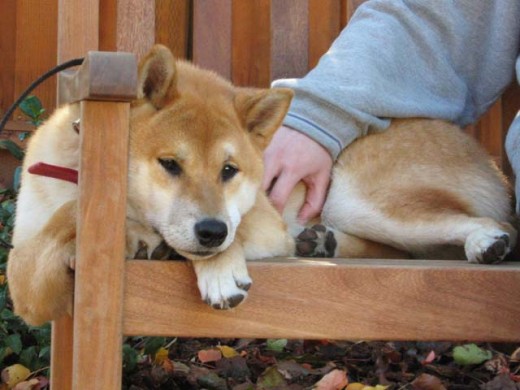
The Shiba Inu – What’s That?!

The Shiba Inu is a Japanese dog breed. There are six original distinct breeds of dog from Japan, and the Shiba Inu is the smallest one.
The largest in the group is the Akita. There aren’t many red and white Akitas in the United States, but the few that I have seen, look just like larger versions of the red Shiba Inu. And not in the Schwarzenegger-DeVito sort of way.
Between the Akita Inu and the Shiba Inu, are the medium sized Japanese dog breeds, including the Shikoku, Kai, Ainu, and Kishu. These six Japanese dog breeds have very similar appearance and temperaments. They all belong to the Spitz dog family.
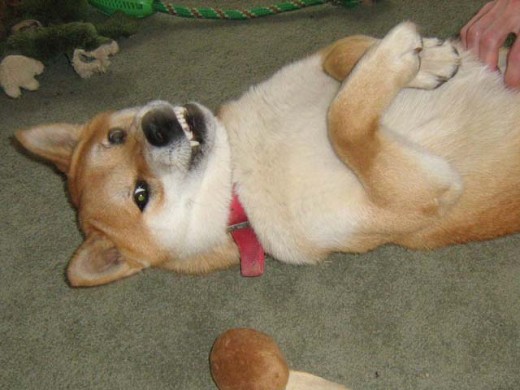
Shiba Inu – What Does It Mean?
The Kanji or Japanese character for ‘dog‘, can be pronounced as ‘Inu‘ or ‘Ken‘. Therefore, Shiba Inu simply means Shiba dog. Sometimes, you will also hear the Shiba dog being referred to as Shiba Ken.
The exact interpretation of ‘Shiba‘, is less clear. It could mean ‘red shrub‘, for the red bushes that grow in the region, where Shibas come from. Alternatively, it could also mean ‘small‘.
The Shiba Inu is certainly a cheeky little red shrub, so both interpretations work out well.


Shiba Inu – What Does It Truly Mean?
I know that discussions of red shrubs are truly riveting, but you probably want to move on to what it truly means to be Shiba, am I right?
Well, you know what they say about red-heads and their fiery temper.
The same is also true of the red-headed Shiba Inu. You may think that you can get around this thorny issue, by getting a Shiba of another color, such as the red-sesame, black and tan, or cream colored versions. However, the Shiba God is indeed one step ahead of you.
Shiba Inus of all colors, have the same fiery red personality.
That is why they are also known as –
- The ‘devil dog’,
- The ‘not for everyone dog’, and
- The ‘honey, why the hell did you get this thing?! dog’.
Indeed, the Shiba Inu is not recommended for first time dog owners.
However, figuring I was smarter than everyone else, or mainly because of lack of research, I decided to get a Shiba as my first dog anyway. It was not an easy first dog experience, but after over a year, Shiba Inu Sephy and I reached a somewhat peaceful state of cohabitation.
My little red shrub still has some thorns, but he is growing some beautiful flowers as well.
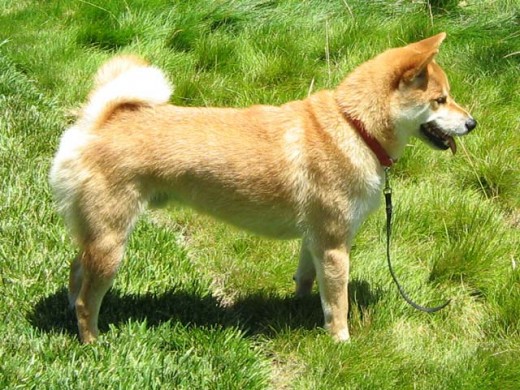
Mame Shiba
Standard sized male Shiba Inus tend to range between 20-25 pounds, for an average weight of around 23 pounds. Female Shiba Inus are slightly smaller, and have an average weight of 17 pounds. There are always outliers though.
My male Shiba is a big boy, and comes in at around 30 pounds. He is not an overweight dog, just big-boned.
Recently, some breeders in Japan and the United States have started breeding Mame Shibas, which are essentially smaller sized Shibas. ‘Mame‘ means ‘bean‘ in Japanese, so these are bean-sized Shibas.
Mame Shibas are not recognized by any of the kennel clubs in Japan, or in the United States. As a result, the breeding of Mame Shibas is not regulated, and many of the breeders who sell them, do not breed for health or temperament.
Since the Shiba Inu is already a difficult dog breed to begin with, we want to try and get one that has a balanced temperament. Therefore, it is best to get a Shiba from an accredited club breeder, who has to follow strict breeding guidelines.
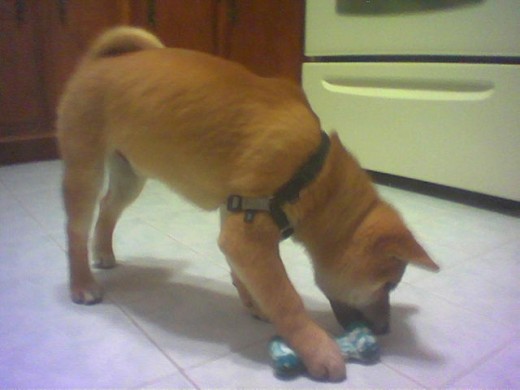
Jomon Shiba
The Jomon period is the time in Japanese history from around 14,000 B.C. to 400 B.C. The Jomon inhabitants reared hunting dogs that were a big part of their culture.
Archaeological sites have uncovered well-preserved skeletons of the Jomon dogs, which show that they have prick ears and a sickle tail. Scientists believe these dogs to be the ancient ancestors of the Shiba Inu, and the other five original Japanese dog breeds.
Some breeders in Japan have founded the Shibaho association, to breed dogs with physical characteristics that conform to the Jomon dogs of old.
The Jomon Shiba is a more feral looking Shiba, with a narrower head, and larger teeth. True to their even more primitive roots, Jomon Shibas are more stubborn and less obedient, than their domesticated Shiba Inu brothers.
Given the already high level of stubbornness and willfulness in a regular Shiba, it may be best to stay away from these Jomon dogs.

Shiba Inu – Why Not?


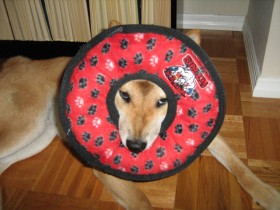


Truthfully, there are many easier and friendlier dog breeds than the Shiba Inu.
The Shiba Inu is independent and aloof. If we want a lap dog who likes to cuddle with us, then the Shiba is not for us.
The Shiba Inu is feisty and active. If we want a calm dog that just lies at the end of our bed, and warms our feet, then the Shiba is not for us.
The Shiba Inu is a dog rebel. If we want an obedient dog that follows our every command, and only lives to please us, then the Shiba is not for us.
Why Do People Get Shiba Inus?
Yeah, they are a bit nuts. Maybe more than a bit nuts. However, once we get beneath that fiery red temper, we will find a rich and deep Shiba soul.
The Shiba Inu is a trickster. He likes to play tricks, and he likes breaking rules. We will never be bored if we live with a Shiba, because he will always be up to something. Sometimes, it is even something good.
The Shiba Inu is a clown. He likes being the center of attention, and he will do much to get to that coveted spot. What he does, will be original, funny, and very entertaining. In fact, Shibas remind me of stand-up comedians. They can easily make others laugh with their crazy hi-jinks, but they have a very sensitive and fragile soul.
The Shiba Inu is a charmer. He can charm birds from the trees, if he wants to. Most of the time, he may not want to, but when he does, look out! It is simply not possible to resist those deep dark eyes, his infectious grin, or roguish charm.
The Shiba Inu is one of a kind. He is not like a regular dog. In fact, many people describe the Shiba as a dog that is more like a cat.
If we want a dog that is a bit different, a dog that will challenge us and grow with us, a dog that will surprise us in both delightful and sometimes non-delightful ways, a trickster, a prankster, and a rogue, but sensitive, deep, and surprising – then the Shiba Inu is the dog for us.
He is like Han Solo and Indiana Jones, except with more fur and without the hat!
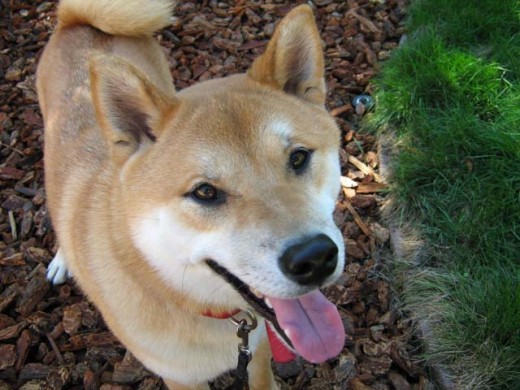
Getting a Shiba Inu

Should we get a Shiba Inu puppy?
That would depend on our temperament, lifestyle, and the amount of time we can devote to a new puppy. The Shiba Inu is a challenging dog breed, because he is extremely stubborn, dominant, and smart.
Shiba Inu training is a must, and it can be a very time consuming and frustrating process, especially in the beginning.
Patience and time are two key ingredients, that we will need in abundance.
Shibas are inside dogs, that need the company of their people. A Shiba puppy that is constantly left in his own company, will become stressed, unhappy, destructive, and aggressive.
If you still want a Shiba Inu after all this – then get a puppy from an accredited breeder, or from a Shiba Inu rescue.

The reason we decided to adopt a Shiba Inu was because we found a stray several months back that stole our hearts and it happened to be a Shiba inu per the vet. She was a gorgeous cream and five years old. The owner surfaced a week later and it was devastating to give her back because we grew so attached to her! I am glad for the experience, because it showed us that we wanted to own a Shiba of our own. We now own a four-month-old female Shiba inu and she has a similar temperament to the one we found. I’m glad we made this choice, and it is important to find a reputable breeder. She was well socialized and is fine with other dogs. She has a beautiful sesame color and I’m excited to see what her markings will be like when she’s an adult! We all love her, and do get a kick out of her sweet and comical ways:) She is an excellent companion for my girls and is a bit aloof at times but is coming out of her shell more more. We understand the temperament and it may not be the right dog for everyone, but we love her personality! Not to go too deep into my history, but growing up, my family had adopted an Akita mix. He was the best dog that I’ve ever had! Akitas get a bad rap as well as shibas for aggression but neither of the dogs I’ve owned were like this.But every dog is different and every experience is different. I say, go with your gut and get the dog if you really want it! Do the research and talk to breeders and other owners about them. This is a great website as well to get ideas!
Mine, who was well socialized as a puppy, became more and more aggressive towards strangers and especially other dogs as he got older, and fixing him at 3 years old didn’t help. It might have had something to do with getting bitten by an older dog when he was 1.5.
He also became more independent as he got older; he would leave us behind for longer periods when we released him during a hike or by the seaside. Eventually, we could only get him back with meat treats.
However, he was the most intelligent dog I have ever encountered. My grandmother’s Shetland was close…but not quite as smart.
Hello,
I am a lover of race shiba Nu
My dream is to have a couple of them here at home,
I would love to buy from Japan for the quality and purity of the breed.
I would like to ask for help to know which kennel can buy, how do you import it, I live in Brazil.
I want to have security to buy a beautiful and healthy animal
Thank you and I look forward
Luis Carlos
Hello, I’ve been having my Shiba for 2 weeks now. He’s a fast learner but has very short attention span (he would even gets bored of treats). I taught him to sit, shake, high five, and lie down. But he gets too excited sometimes that he bites and would not stop. I tried to use your advice on redirecting him to toys, but he ignored the toys most of the time. If you have any advice. Please help!!! And also I would love to have some advice on putting harness & leash on him as well as when I should switch his puppy food to adult food. As you know Shiba is a smallest breed in Japan. However, I am not sure if it is a small breed in the U.S. as well. I’m having a hard time figuring out which food I should give him ince he outgrown his puppy phase.
Oh in the US my shiba, SImba, which is 23 pounds is considered medium at 38 cm high. My dog ignored toys and treats, the ONLY way I could train my dog was with positive reinforcement as in my excited voice saying good boy, good boy. In short my dog sometimes refuses steak as a treat if he doesn’t want to do what you are asking him, he will literally walk away but he is a sucker for good attention. Also, if you put the toys in a box and not on the floor and ONLY bring them out to train he may be less bored of the toys and also reduces toy agression with other dogs (my trainer taught me to do that as we have a german shepard as well). My dog was nicknamed the houdini as he got out of 2 different harnesses, he got out of a regular collar, and he got out of a collar and leash meant for pitpulls (the leash weighed 2 pounds and was metal- there were no spokes in the collar but when he tried to pull the leash out of our hands to run he was much slower and easier to catch). Finally, I stuck with a training collar that tightens when they try and pull, it does NOT stop him in the least and he hasn’t hurt himself but it is the only collar he has not gotten out of. I would switch his puppy food to adult food slowly and maintain the same kind of dog food so he doesn’t have a reaction. Usually the switch happens at 12-14 months of age for the dog.
Hi, I wanted to tell you that I’ve been reading your website for quite a while and finally decided to adopt a Shiba. I’m french and so I thought I could help people like you by making a similar website (http://chienjaponais.fr) it’s not much but I hope it can help some people :).
Thank you and have a nice day,
I have had my shiba since she was ten weeks old and shes 8 months now. Potty trained really easy and has been a great joy to me. I have an illness and on bad days she stays right with me and comforts me. She silly and very entertaining. Loves to cuddle and be where ever we are either inside or out. I can leave her out of her kennel when I go places for up to an hour and she has behaved the whole time. Yes, she does have her stubborn moments that only make me laugh because it is funny to me that these dogs which are not that big have these huge personalities!! She is also great with kids. I love my bailey girl.
Always great to hear a happy dog story. Thanks for sharing it with us and and big hugs to Bailey!
Thank you and God bless!
“Mame” means bean, right. But the Japanese put on everything smaller than regular size e.g. sleeve sized dictionaries, tankettles, midget subs etc. So in this case “mame” only means “small”.
I have two dogs, one a Border Collie mix and the other my Shiba. Both are 4 years old, I’ve had the BC since he was a pup and the Shiba only for two years (her original owners could not handle her!) She is much calmer with my BC as a buddy than alone. She would be miserable as an only dog. These two are polar opposites when it comes to behavior and obedience. My BC lives to please me. 🙂 He does not like being scolded and he responds very well to praise. Shiba doesn’t really notice much either way. Both are food-oriented and I’ve managed way more progress training my BC than Shiba. Shiba learns quickly and takes a lot of time to unlearn bad habits (like not going potty while on leash… that took us months to overcome.) I have to outsmart her in order to get what I want. She does take a lot more of my attention and I enjoy learning how to be a better dog trainer. That being said, I would not recommend a Shiba for anyone who doesn’t have a ton of patience — that and a very flexible, creative approach will be necessary to thrive with this dog. I can never let Shiba off leash. She is crafty and sneaky. Example — she will eat the cat’s food in a heartbeat whereas BC knows this is wrong and will sit with a worried look on his face as he watches Shiba sneak cat food behind my back, knowing I’m going to be upset as soon as I realize it. HAHA! The BC is a great companion and partner, he can read my mind almost, and I prefer that in a dog. Shiba is super cute, no doubt, but in my opinion, requires advanced level understanding of animals and endless patience. There are too many Shibas without homes and in danger of being euthanized in a shelter — because owners fall for their cuteness and then cannot handle them. Mine was dumped after her owners bought her as a puppy for almost $1,000!!! Can you imagine? Two years later they dump her because she’s the “worst dog” according to them. On the contrary, she is a wonderful creature but takes a lot of attention. If you want one, please get a rescued Shiba or an adoption rather than pay money to support any type of puppy breeder!
my shiba inu Yusha is an angle! i didn’t exprience any problems… you need to train her as soon as you can. they are very smart breed and she knows very well what not to do.
she is my first dog (but i worked at a zoo for 2 years..)
WOW
Such foxe
Very doge
So barke
Much resemble
Can I leave a puppiea at home for about how long before he gets distructive
Are you considering buying or adopting a puppy? What age is the puppy? What kind of training has the puppy had? What is the puppy’s background? What will be the puppy’s daily routine?
Dog behavior is very context dependent, so the daily routine, temperament, past experiences, environment, and more of the dog will all play a role.
Puppies cannot hold their pee for very long periods of time, so they will need a lot of supervision during the potty training period. A Shiba puppy is going to need extra training, rules, and structured activity. When my Shiba was young, I got him used to alone time slowly. I start with very short periods of alone time (seconds) and *slowly* build up from there. This ensures that he doesn’t develop separation anxiety.
https://www.aspca.org/pet-care/virtual-pet-behaviorist/dog-behavior/separation-anxiety
Hi!
I apologize in advance for any mistakes I might make, since I’m not a native speaker 😉 I am thinking about getting a dog in two or three years, and since I am really looking forward to it, I have been searching the Internet for suiting races. My boyfriend wanted a husky at first, but since we won’t be able to take them to work with us (like a friend who has one, he is a forestkeeper), or go hiking for several hours a day, and I am more into agility and obedience than into sheer running with the dog, a huskey probably isn’t the right choice.
Since we both like the naturally looking dogs and spitz types, I stumbled upon the japanese races. I first thought about getting a shikoku, but apparently they are bred nearly nowhere in Europe. The Shiba is.
I have some experience with a dog, a mix of a spaniel and a kooiker. She loves agility and running, especially chasing gamessince she loves agility more than sheer speed. But she is not really the dominant type, rather the opposite! So I am worried about getting a shiba, I have not much experience with really dominant dogs. How hard is it? Do they become rebellious against the owner if dominated? Or do they respect commands when they have accepted you as a competent leader? And: can you keep them in an apartment, if you go outside with them sufficiently?
Do you know about the other japanese races? Are others maybe better suited for our conditions?
I really love your page btw, one can see how much you love your cuties 🙂
What do you mean by dominated?
My Shiba is very stubborn and he knows his own mind. He does best with a fixed routine, structure, and a consistent set of rules. I also need to be very consistent with his training, and with not letting him get away with stuff.
However, forceful physical techniques did not work well with Shiba Sephy. Instead, I observe him very closely, identify the things that matter to him most, and then use those things to motivate and redirect him. I don’t physically force him to do anything because that will only make things worse and make him be more stubborn. Rather, I structure things so that he decides to do what I want him to do. 😀
More on training my Shiba.
I had a very difficult time with Sephy in beginning. Most of that was my own fault. I did not have any experience with dogs, did very little research into the Shiba breed, and really had no clue what I was doing. As a result, I made many mistakes in the beginning, including using aversive and dominance techniques. Things would have gone a lot more smoothly if I had done my homework before getting Sephy, as you are doing yours now.
I have a much better relationship with Sephy now, and he is quite a wonderful guy to have around. However, he is still *not* a Yes-Sir,No-Sir kind of dog. For example, he is loyal and will generally stay close to his people. However, his recall is pretty terrible, and he will only come when it suits him. He likes following other dogs though, so if I recall the other dog, he will come along too. With Sephy, I need to be flexible and think outside the box. 😀
More on why Shiba’s are difficult to train.
My early experiences with Shiba Sephy.
In terms of apartment living, I think Shibas can do quite well with that. Here is a comment from C about her Shiba and living in an apartment.
I have not lived with any of the other Japanese breeds so I don’t have much to say there.
The Shiba Inu Forum is also a good place to visit to get thoughts on the breed and the Nihon Ken has discussion on all six of the Japanese breeds.
Hope this helps. 😀
oh yes, it does help a lot! 🙂
by dominance, i didn’t mean leash jerking or something like that, I never could do that anyway! our dog hates things like that, too (my little sister sometimes does it, sadly), and though our dog reacts by shrinking away and submitting rather than defiance, it’s obvious it’s not the right way to get a happy and trusting dog. I rather meant: our dog, especially when she’s not sure what to do in a situation, looks to us for advice, and follows it gladly; she likes us being the ones in control, because she trusts us; her trust was very quickly earned, even after a week with us she already hid behind me in puppy class because she was afraid of one big pup 😀
how about a shiba? does he accept you as more competent in some situations, or does he simply follow your orders because he was trained to do so, and would much rather like to have his own will? does he see you as a leader or a competent partner, or just someone who has more ressources (leash control, control of food and goodies) and therefore gets to decide (sometimes)?
it’s not so much that i want an overly obedient dog, but the feeling that our dog trusts me and relies on me has always brought me the greatest joy. she is quite easily frightened when on her own, but when i do something with her she was initially frightened of, like going near big dogs, she immediately forgets her fear, and that is a beautiful bond between us 🙂
can you get something like that with a shiba, if you do it right? or is he too independent of humans to bond like that?
the forums will be of great help,too, I bet 🙂 I read some books and thoroughly searched the internet in the meantime, and found a breeder I’d like to visit, so the wish of getting a shiba is getting more concrete!
My Shiba knows his own mind and he will only do things that make sense to him. He follows commands when it makes sense to him, for example when the rewards are deemed worthy of the task. He is very stubborn, so forceful techniques and head-on challenges do not work well with him. When challenged, he will dig in more and hold his position. Sephy has a very strong will, he is bold, and he makes his own decisions. He is definitely *not* a follower.
Sephy also does not trust easily. It took a good long while to earn his trust, and even now he only trusts to a certain level. He is a lot more aloof compared to my other dogs. He will sometimes ask for affection, but much less so than my Huskies.
Shibas are often characterized as a dog that is more like a cat. They are independent, clean, and aloof like cats.
http://shibashake.com/dog/shiba-inu-a-dog-that-is-more-like-a-cat